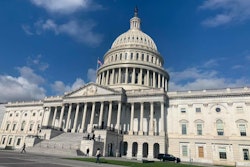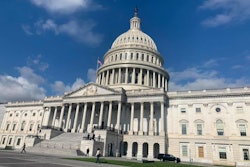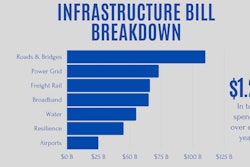
After months of debate, lawmakers in the Senate have come to a final agreement on the $1.2 trillion bipartisan infrastructure bill. The package, called the Infrastructure Investment and Jobs Act, is the culmination of drawn-out and painstaking negotiations between a bipartisan group of senators and the Biden administration and will allow both parties to claim a win after extensive work across the aisle.
The legislation passed after the group worked through the weekend to come to agreement on some last minute issues. Senate minority leader Mitch McConnell officially voted in favor of the bipartisan infrastructure bill, joining 18 other Republican senators.
Sen. Bernie Sanders (I-VT) blocked an amendment on Monday to limit a proposal to increase federal regulation of cryptocurrencies. Sen. Pat Toomey (R-PA), brought the amendment up for unanimous consent, but after Sen. Richard Shelby (R-AL) tried to attach his untreated proposal to boost military spending by $50 billion, Senate TV
Senate TV
The group worked through 281 total amendments to the 2,702 page bill before it was taken up for a final vote.
"We have come to an agreement for final passage of the bipartisan infrastructure proposal," Sen. Charles Schumer said. "Let me say this - it has taken quite a long time, and there have been detours and everything else, but this will do a whole lot of good for America. The American people will see the most robust investment in our nation's infrastructure in decades."
Schumer said this investment was a "decades overdue step" to help bolster every sector of funding for our crumbling infrastructure.
Highlights:
- $303.5 billion over five years for Federal Highway programs, a 35% increase from previous bills
- Overall package includes $40 billion in dedicated resources for bridge repair, replacement and rehabilitation, which is the single largest dedicated bridge investment since the construction of the interstate highway system
- The bill features a $118 billion bailout of the Highway Trust Fund from the Treasury’s general fund
- $55 billion for water projects with a focus on upgrading infrastructure - largest investment in clean drinking water in our nation's history
- Project permitting overhauls to move projects forward more quickly. The environmental impact statements under NEPA takes an average of seven years. This bill provides numerous provisions including the One Federal Decision for highway projects which establishes a two year goal for project approval
- $66 billion in passenger and freight rail
- $65 billion to rebuild the electric grid
- $65 billion to expand broadband Internet access
- $39 billion to modernize and expand transit systems
- $7.5 billion to build a national network of charging infrastructure for electric vehicles
The legislation includes $550 billion in new spending, which Biden and Democrats had sought. The remainder of the package is funded by tapping unspent coronavirus relief funds already in law.
The bill will now head back down to the House for review. Many say conflict is brewing between progressives and moderates in the House over how to handle it. Moderates want an immediate vote on what the Senate has produced, whereas progressives want Speaker Nancy Pelosi (D-CA) to stick by her promise to pass a reconciliation bill before considering the bipartisan bill.
Pelosi has stressed she will not take up the infrastructure bill or Democrats’ separate proposal to expand the social safety net until the Senate passes both of them. The House does not return from recess until Sept. 20
Budget Resolution Up Next
This historic bipartisan achievement is to be followed by action on a budget resolution that will open the door to a $3.5 trillion collection of spending for centerpieces of President Biden’s domestic agenda.
In the Senate, Democrats must keep all 50 members together, including centrists who have already balked at the $3.5 trillion price tag. In the House, Democrats also have a slim majority. Republicans will oppose the measure unanimously and argue the spending is irresponsible.
The Senate will vote on the budget resolution to unlock the reconciliation process. Schumer said that the chamber will “immediately” vote on proceeding to the budget measure after finishing the infrastructure bill. Republicans are also criticizing the process used for moving the measure as shutting them out. It is the same budget process used to pass the Trump tax cut bill, which also added to the deficit.
Schumer has given committees a Sept. 15 target to finish writing their portions of the final legislation. The bill would then have to work its way through both chambers of Congress.
"We are moving on to a second track that will make generational improvements in the fight for climate change and equity for the American people," Schumer said. "We want to cut taxes for American families, we want to create millions of jobs to combat the climate crisis and we want to pay for it by having corporations finally pay their fair share."
Schumer said the longer these debates take, the longer the Senate will be in session.




















